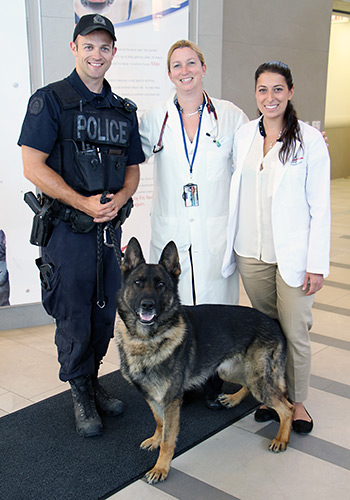
By Karen Mantel
Working dogs are akin to human athletes – highly physical and in peak condition. Like athletes, preventive care is integral to staying at the top of their game. That’s the case for the working dogs with the Guelph Police Service.
“We need to ensure they are in top physical shape,” says Tiffany Durzi, veterinarian with the Ontario Veterinary College’s (OVC) Smith Lane Animal Hospital, the official veterinary clinic for the three police dogs with the Guelph Police Service. “We’re trying to prevent disease before it happens.” The clinic is in the Hill’s Pet Nutrition Primary Healthcare Centre on the University of Guelph campus.
While companion animals typically have an annual physical exam, the dogs with the Guelph Police Service have physicals twice a year. This ensures they are up-to-date on vaccines, preventive bloodwork to check for anemia and kidney and liver function, and parasite prevention, explains Durzi. As working dogs, they have an increased risk of exposure to parasites, while searching in the woods for example.
Their caloric intake also needs to meet their high-energy needs. “We muscle and body-condition score them during each physical to make sure they are getting enough kilocalories,” adds Durzi.
The dogs and their police handlers are partners and the human-animal bond is particularly strong. The bond with Charger “is unlike any bond I’ve experienced,” says officer Andrew Crowe, Charger’s handler. “He reads my body language and I read his body language and visual clues.”
Charger was 10 months old when he was partnered with Crowe, who completed all of Charger’s training with him, including obedience, agility, scent tracking, as well as scent detection of narcotics, firearms and Canadian and American currency.
“He’s committed to go into any situation I ask him to and I hold this in very high regard. We do things as a team,” adds Crowe. “He will read your tone, your sweat — he knows you better than you know yourself.”
Charger, who turns five this fall, is in great shape and very active, adds Crowe. On the days he isn’t working, Charger still needs at least one run a day.
The connection between the Guelph Police Service and OVC is a long-term one. The deep-chested German Shepherd breed can be prone to gastric dilatation-volvulus (GDV), commonly known as stomach bloat. Nitro, another canine unit member, encountered GDV a few years ago and had to be rushed to the OVC Companion Animal Hospital, a specialty referral hospital, for emergency surgery in the middle of the night. GDV is a life-threatening condition in which the stomach expands, flips over and twists inside the abdominal cavity, trapping food, air and water in the stomach and interfering with the flow of blood from the abdomen back to the heart. Mortality rates in dogs with GDV can approach 30-40 per cent.
The potential for stomach bloat in breeds such as German Shepherds increases if the dogs are physical shortly after eating — always a possibility with a working dog. “If there is a robbery or a missing person, we can’t wait,” says Crowe. “We will be working.”
As a preventive measure, the police service opted to have a minimally invasive gastropexy procedure completed on Charger and General, another of the police service dogs, to ensure they didn’t encounter the same emergency situation. During the surgery, the stomach is stitched to the abdominal wall to prevent it from flipping. Prof. Ameet Singh, Clinical Studies, and his team at OVC performed the procedure.
At home, Charger is a pet, but at work he’s focused on Crowe and the job. “When Charger hears the cruiser keys he can’t wait to go to work,” says Crowe.
Nitro sadly passed away in July 2015 after distinguished service with the Guelph Police Service.